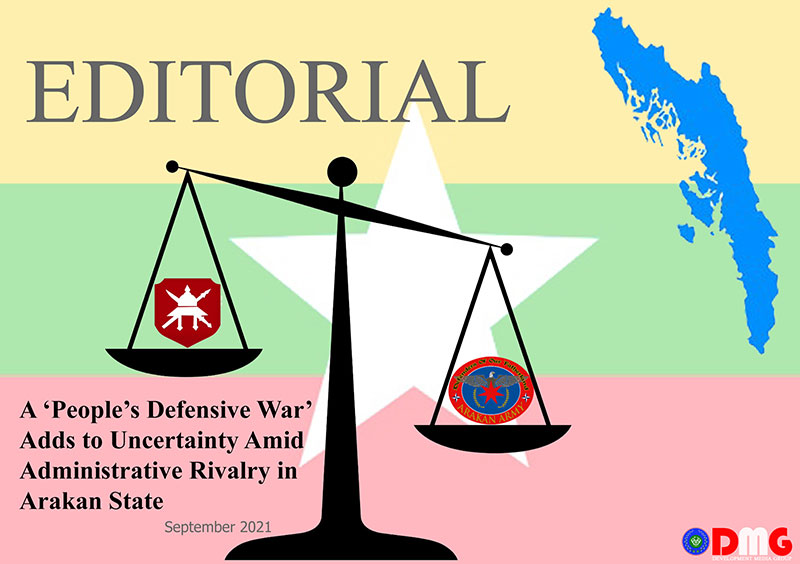Editorial: A ‘People’s Defensive War’ Adds to Uncertainty Amid Administrative Rivalry in Arakan State
Long before the military coup on February 1 and the subsequent death and destruction wrought by Tatmadaw forces seeking to suppress dissent, the consequences of conflict were familiar to the people of Arakan State.
08 Sep 2021

Locals say the Myanmar military has been sending reinforcements to Arakan State, but the Tatmadaw denies the allegations. The Arakan Army (AA) is closely monitoring the activities of the military, according to U Khaing Thukha, spokesperson for the ethnic armed group. The apparent rising unease between the two armies comes as the National Unity Government (NUG) declared a “people’s defensive war” against Myanmar’s military junta this week.
An uptick in clashes between the junta and opposition forces has been reported since the NUG declaration, but for now Arakan State remains a region of relative post-coup calm.
Nonetheless, the situation on the ground deserves a closer look. The Arakan Army has expanded its administrative machinery in Arakan State and is also making inroads on the establishment of a separate, parallel legal system in the state. Such actions by the Arakan Army will no doubt be viewed as provocative by the Myanmar military, aka Tatmadaw.
People in Arakan State live in fear. Locals must cooperate with the Arakan Army or the Myanmar military when troops from either army enter their villages.
Locals in Arakan State are arrested by both sides for various reasons. Arrests have been made by the Arakan Army on the pretext of the targeted individuals having acted in some way to disrupt “the revolution.” The Tatmadaw has killed and detained a number of people on suspicion of having illegal links with the ethnic armed group.
Fighting in Arakan State has abated, but it is not certain that this will remain the case. AA chief Major-General Twan Mrat Naing has said the ethnic armed group hasn’t signed any formal agreement with the Myanmar military.
The Arakan Army is expanding its administration by conquering the countryside and encircling the urban areas. We can see that the activities of the Arakan Army are, for the most part, warmly welcomed by the local people. But for the AA project to succeed, those in charge — from the grassroots level to the highest echelons of administration — must be free from corruption and act without personal grievances.
Although the situation on the ground is militarily stable, tensions between the Arakan Army and the Myanmar military are growing due to administrative rivalries.
Long before the military coup on February 1 and the subsequent death and destruction wrought by Tatmadaw forces seeking to suppress dissent, the consequences of conflict were familiar to the people of Arakan State.
More than 300 innocent people were killed and hundreds more were injured in Arakan State during the two years of heavy fighting between the Arakan Army and military, which came to a halt toward the end of last year. At its peak, more than 200,000 people were displaced by the conflict.
These are the consequences of war, and if the fighting returns to Arakan State, the people will suffer once again. Indeed, they are likely to face a worse situation than ever before.
Competitive governance in rural areas is a successful revolutionary step for the Arakan Army, but it is feared that the Tatmadaw will act out of resentment against the rural population.
At present, the Arakan Army is not a government and the Myanmar military is not a legitimate government. Of the two, most Arakanese people prefer rule by the former to that of the latter.
There are many questions. Will the Arakan Army commit to a formal ceasefire and focus on regional development like the Wa or Mong La ethnic armed groups, or look for more opportunities by other means? And what effect will this week’s NUG declaration of a “people’s defensive war” have on the calculations of both AA and Tatmadaw leaders in Arakan State and beyond?
Come what may, one thing seems certain: The evolving administrative dynamics in Arakan State and a new, potentially more volatile phase in the country’s ongoing civil war are likely to continue to strain the Tatmadaw-AA relationship, with the possibility of renewed conflict very real.






.jpg)













